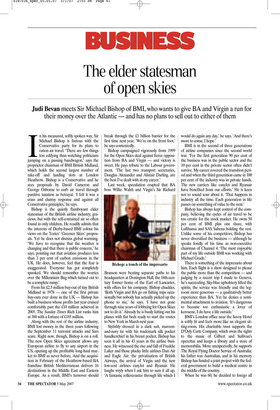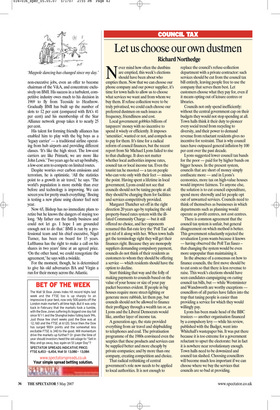The elder statesman of open skies
Judi Bevan meets Sir Michael Bishop of BMI, who wants to give BA and Virgin a run for their money over the Atlantic — and has no plans to sell out to either of them In his measured, softly spoken way, Sir Michael Bishop is furious with the Conservative party for its plans to ration air travel. ‘There are few things less edifying than watching politicians jumping on a passing bandwagon,’ says the proprietor chairman of BMI British Midland, which holds the second largest number of take-off and landing slots at London Heathrow. Bishop is a Conservative and he sees proposals by David Cameron and George Osborne to curb air travel through punitive taxation as betrayal. ‘I felt it was a crass and clumsy response and against all Conservative principles,’ he says.
Bishop is the quietly flamboyant elder statesman of the British airline industry; gracious, but with the self-contained air so often found in only children. He readily admits that the interests of Derby-based BMI colour his views on the Tories’ ‘Greener Skies’ proposals. Yet he does not dismiss global warming. ‘We have to recognise that the weather is changing and that there is public concern,’ he says, pointing out that aviation produces less than 3 per cent of carbon emissions in the UK. He does, however, feel that the fear is exaggerated. ‘Everyone has got completely spooked. We should remember the worries over the Millennium Bug which turned out to be a complete ramp.’ From his £2.5 million buy-out of tiny British Midland in 1978 — one of the first private buy-outs ever done in the UK — Bishop has built a business whose profits last year cruised comfortably past the £10 million achieved in 2005. The Sunday Times Rich List ranks him at 388 with a fortune of £185 million.
Along with the rest of the airline industry, BMI lost money in the three years following the September 11 terrorist attacks and Sars scare. Right now, though, Bishop is on a roll. The new Open Skies agreement allows any European airline to fly to any airport in the US, opening up the profitable long-haul market to BMI as never before. And the acquisition in February of the Heathrow-based BA franchise British Mediterranean delivers 16 destinations in the Middle East and Eastern Europe. As a result, BMI’s turnover should break through the £1 billion barrier for the first time next year. ‘We’re on the front foot,’ he says contentedly.
Bishop campaigned vigorously from 1999 for the Open Skies deal against fierce opposition from BA and Virgin — and victory is sweet. He pays tribute to the Labour government. ‘The last two transport secretaries, Douglas Alexander and Alistair Darling, are the best I’ve dealt with in my career.’ Last week, speculation erupted that BA boss Willie Walsh and Virgin’s Sir Richard Branson were beating separate paths to his headquarters at Donington Hall, the 18th-century former home of the Earl of Lancaster, with offers for his company. Bishop chuckles. ‘Both Virgin and BA go on fishing trips occasionally but nobody has actually picked up the phone to me,’ he says. ‘I have not gone through nine years of lobbying for Open Skies not to do it.’ Already he is busily kitting out his planes with flat beds ready to start the routes to New York in March next year.
Stylishly dressed in a dark suit, maroonand-navy tie with his trademark silk pocket handkerchief in his breast pocket, Bishop has seen it all in his 43 years in the airline business. He witnessed the rise and fall of Freddie Laker and those plucky little airlines Dan Air and Eagle Air; the privatisation of British Airways, the arrival of Virgin and the new low-cost airlines easyJet and Ryanair. He laughs wryly when I ask him to sum it all up. ‘A fantastic rollercoaster through life which I would do again any day,’ he says. ‘And there’s more to come, I hope.’ BMI is in the second of three generations of airline companies since the second world war. ‘For the first generation 90 per cent of the business was in the public sector and the 10 per cent in the private sector often didn’t survive. My career covered the transition period and when the third generation came in 100 per cent of the industry was in private hands. The new carriers like easyJet and Ryanair have benefited from our efforts.’ He is keen not to sound sour about it. ‘That happens in industry all the time. Each generation in life passes on something of value to the next.’ Bishop has always kept control of the company, believing the cycles of air travel to be too erratic for the stock market. He owns 50 per cent of BMI plus one share, with Lufthansa and SAS Sabena holding the rest. Unlike some of his competitors, Bishop has never diversified the business — although he speaks fondly of his time as non-executive chairman of Channel 4. ‘The most enjoyable part of my life outside BMI was working with Michael Grade.’ There is something of the impresario about him. Each flight is a show designed to please the public more than the competition — and judging by a recent trip I made to Geneva, he’s succeeding. Sky-blue upholstery lifted the spirits; the service was friendly and the legroom more generous — a qualitatively better experience than BA. Yet he denies a sentimental attachment to aviation. ‘It’s dangerous to become too enthusiastic a lover of kerosene. I do have a life outside.’ BMI’s London office near the Savoy Hotel is softly lit and feels more like an elegant sitting-room. His charitable trust supports the D’Oyly Carte Company, which owns the rights to the music of Gilbert and Sullivan’s operettas and keeps a library and a store of memorabilia. More unexpectedly, he supports The Royal Flying Doctor Service of Australia; his father was Australian, and in his memory Bishop has funded a joint project with the federal government to build a medical centre in the middle of the country.
When he was 60, he decided to forego all non-executive jobs, even an offer to become chairman of the V&A, and concentrate exclusively on BMI. His success in a turbulent, competitive industry owes much to his decision in 1969 to fly from Teesside to Heathrow. Gradually BMI has built up the number of slots to 12 per cent (compared with BA’s 41 per cent) and his membership of the Star Alliance network group takes it to nearly 25 per cent.
His talent for forming friendly alliances has enabled him to play with the big boys as a ‘legacy carrier’ — a traditional airline operating from hub airports and providing different classes. ‘It’s like the high street. The low-cost carriers are like Primark; we are more like John Lewis.’ Two years ago he set up bmibaby, a low-cost arm to compete on limited routes.
Despite worries over carbon emissions and terrorism, he is optimistic. ‘All the statistics point to a growth in air travel,’ he says. ‘The world’s population is more mobile than ever before and technology is improving. We can screen you for pretty much everything.’ Boeing is testing a new plane using cleaner fuel next year.
Now 65, Bishop has no immediate plans to retire but he knows the dangers of staying too long. ‘My father ran the family business and could not let go. I hope I am grounded enough not to do that.’ BMI is run by a professional team and his chief executive, Nigel Turner, has been on board for 15 years. Lufthansa has the right to make a call on his shares in two years’ time at an agreed price. ‘On the other hand, we could renegotiate the agreement,’ he says with a twinkle.
For the moment, though, he is determined to give his old adversaries BA and Virgin a run for their money across the Atlantic.



































































































 Previous page
Previous page